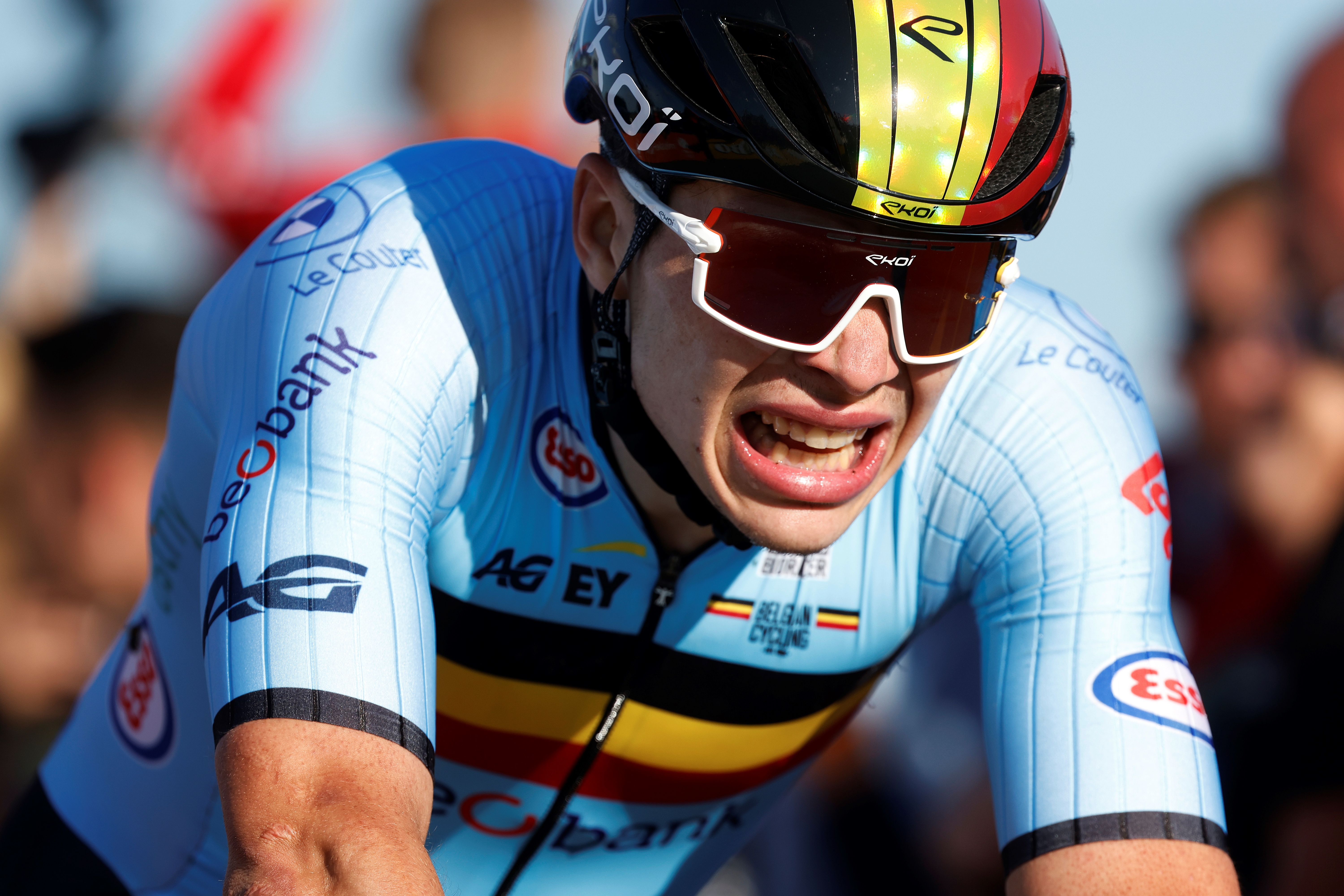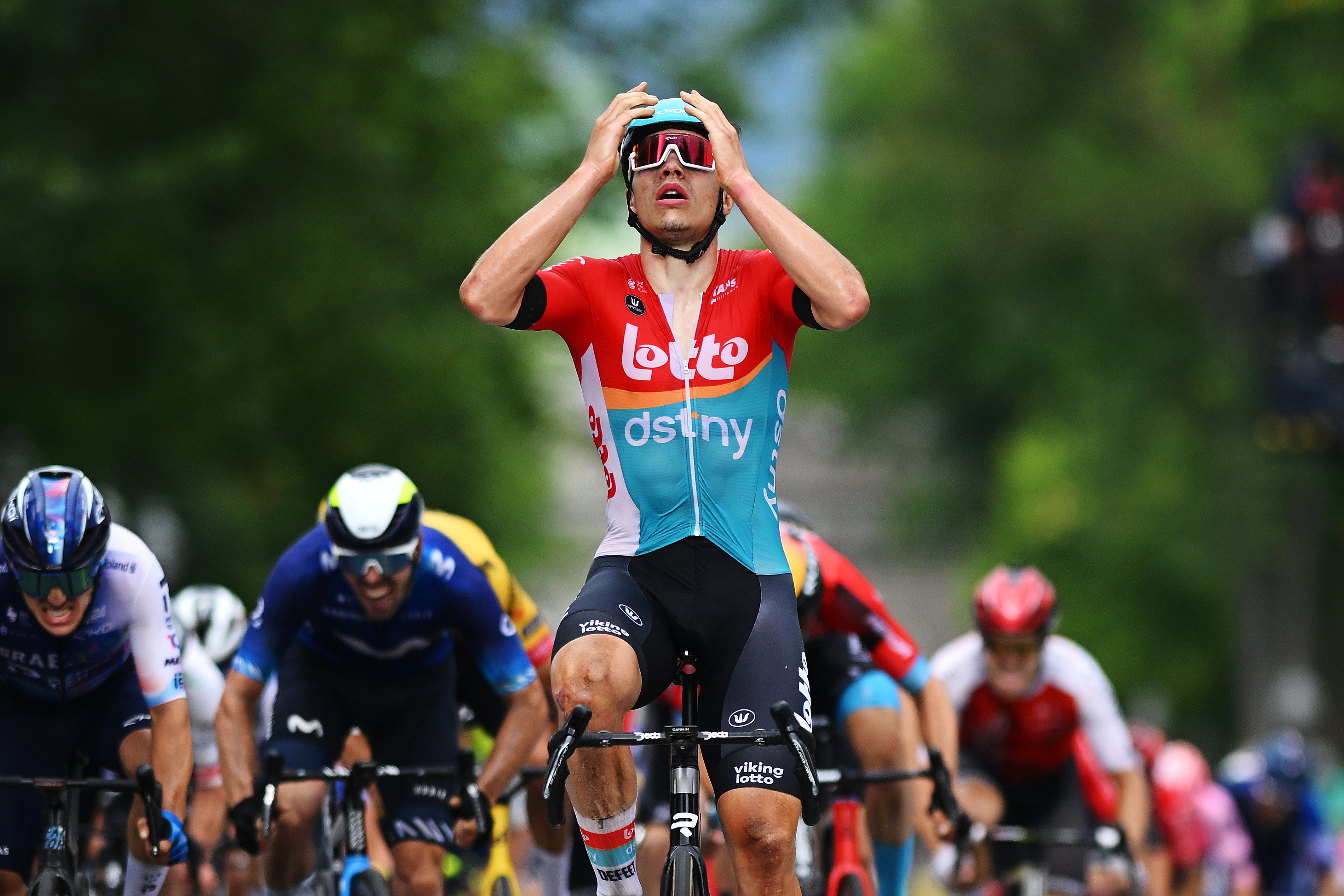'A farmer's son maybe has something more' – Arnaud De Lie goes the distance
Belgian on extending with Lotto-Dstny and targeting the Classics


"If you want to win a WorldTour race, you must be very good," Arnaud De Lie says. It's early September, and the Belgian is sitting in the lobby of the Delta Hotel in Québec. He hasn't won a WorldTour race just yet, but everybody knows it's only a matter of time given his repeated feats of strength Off Broadway over the first two seasons of his professional career.
Two days later, to nobody's great surprise, De Lie justifies his Canadian expedition by stomping his way up the Grande Allée to claim his first top-flight win at the Grand Prix Cycliste de Québec ahead of Corbin Strong and Michael Matthews. The coaching manual says a rider should never sprint with his hands on the hoods, but the 21-year-old's talent is such that he can safely ignore that diktat.
No, the normal rules don't apply here. De Lie underscores the point three weeks later at the Famenne Ardenne Classic, when he pulls his foot out in the final sprint and pedals with just one leg for the final 50 metres. Even at that reduced capacity, he still cranks out enough power to go the distance and hold on for the win. The boy is clearly a bit special.
In between those two victories, De Lie also demonstrates a neat line in racing with one arm behind his back. His form and clear aptitude for the course make him an obvious candidate to lead Belgium at the Road European Championships in Drenthe, but Wout van Aert's seniority – not to mention his pressing need for a big win at the end of a difficult season – decides the hierarchy.
If De Lie is disappointed at his standing, it doesn't show in his performance. On the final lap, he unflinchingly does the job he was assigned to do, and then some, producing a remarkable surge on the VAM-Berg to drag Van Aert back into contention against the lone escapee Christophe Laporte.
Somehow, Laporte still manages to dredge up enough speed to edge Van Aert in the sprint, but De Lie, fourth on the day, hasn't ridden entirely in vain. This will be a most useful calling card for future championships, perhaps even for next summer's Paris Olympic Games. His days as a deluxe domestique are already numbered. Or as former national coach José Decauwer puts it on Sporza afterwards: "I think it is one of the last times that De Lie will work like this for Van Aert."
The latest race content, interviews, features, reviews and expert buying guides, direct to your inbox!
"I don’t know if it’s true, but I do feel that when you're a farmer’s son, you maybe have something more"
Then again, De Lie was already turning heads long before he turned professional with Lotto at the start of 2022. Soudal-QuickStep manager Patrick Lefevere had been tracking De Lie's progress since he was 16 years old – a rapid finisher with the ability to withstand a climb or two is always a winning comination – but this time he missed out on signing a surefire Belgian talent. He made no secret of his intention to revisit the matter when De Lie's first pro contract was due to expire at the end of 2024, particularly given the travails of his own cobble Classics unit in recent seasons.
"Two years go by quickly," Lefevere said in the spring and, according to some reports, the charm offensive included a (literal) flying visit to the De Lie family farm in Lescheret. Unlike Jean de Gribadly famous trek to a farm outside Carrick-on-Suir to court Sean Kelly in the winter of 1976, however, Lefevere's overtures didn't suffice. In August, Lotto-Dstny announced that De Lie had agreed a new, long-term contract that would keep him at the team until the end of 2026.
The decision raised some eyebrows, but De Lie just shrugs amiably when asked about his decision to commit to a Pro Continental squad for another three years. He confessed that the duration was longer than he might have anticipated, but Lotto-Dstny wanted to tie him down until the next WorldTour promotion window in 2026. De Lie, for his part, simply saw no reason to leave an environment that was working for him.
"It was not my intention to extend my contract, but the team really wanted me to extend it until 2026 and Stéphane Heulot the new CEO has a very good project with me," De Lie says.
"After a long discussion with him and my family, I think it was the best choice for me, because we have a very good group, with good teammates and staff. I am also maybe the leader of the team, so I have a lot of trust with teammates and staff. It was a logical choice."
For Heulot, who replaced John Lelangue at the head of a floundering team last winter, securing De Lie's services was his biggest win of his maiden season at the helm, and he couldn't resist couching it as a rare triumph for his outfit over Lefevere and QuickStep.
"I heard that Patrick Lefevere flew to the Ardennes to talk to Arnaud, but the De Lie family did not like that very much," Heulot crowed to Het Laatste Nieuws recently. "They don't like the 'I'll come by helicopter' side. They prefer to have both feet on the ground."

De Lie always had an inkling that he was a good bike rider, but he wasn't always entirely sure how good, simply because he grew up in the sparsely populated southern province of Luxembourg, a long way from Belgian cycling's Flemish heartland.
He started out racing mountain bikes at the age of seven, inspired by his older brother Axel and encouraged by his father Philippe, who had raced a little as an amateur in his youth, and some of his earliest success came across the border in the neighbouring Grand Duchy of Luxembourg. "I was good straightaway, but when you're so young you don't know if that's enough to turn pro," he explains.
As De Lie rose through the age categories, he had to travel further and further afield for competition commensurate with his talent. Supportive parents are useful for any aspiring athlete. In De Lie's case, they were essential.
"It's very difficult in my region to do competitions because they're all in the Flemish part," he says. "If you don't have very good parents who can do a lot of travelling to bring you to races, then it's impossible. I was lucky."
Every rider is a product of their environment, of course, but De Lie's attachment to his homeplace seems an especially profound one. While his near contemporary Remco Evenepoel has understandably decamped to Calpe to avoid the worst excesses of his fame in Belgium, De Lie has no pressing desire to leave his native Lescheret, a village tucked in the rolling hills south of Bastogne.
"A lot of riders do that, but I'm just 21 years old and the background is also very important," says De Lie, more than content with his training roads amid the forests of the Ardennes. "In this moment, it's better for me to stay in my home region with my family and it's also more comfortable for me, because I know everybody there. If I go to Andorra or some other place, it's more difficult, I think. I prefer to stay in my region."
De Lie still lives on his family's dairy farm and, even after turning professional, he continued to help his father after he had finished training for the day. He has since, rather reluctantly, been persuaded to prioritise resting his limbs over milking cows, but he hasn't abandoned the life altogether. His nickname, 'The Bull of Lescheret,' is an apt one.
"I really like farming with my father, but it's difficult to do good training and good sleep together with farm work, so now I go just go to the farm when I have a rest day," he says. Still, like so many farmer's sons before him, from Raymond Poulidor to Miguel Induráin, he has noted certain parallels between his father's occupation and his own life on two wheels.
"If you don't train every day, you don't make a good result. And for a farmer the life is the same: if you don't give your all, you don't get anything. It's the most difficult job for me, when I see my father. He works from 6am to 8pm, so I think it's similar," he says.
"Sometimes when you have difficult periods, you are a little bit tired, and then you see your father out every day, you say to yourself, 'I'm not tired, come on!' I don't know if it's true, but I do feel that when you're a farmer's son, you maybe have something more."

A Belgian title in his first year as a junior in 2019 confirmed that De Lie was on the right track and Lotto laid down a clear pathway to the top level by offering him a spot in their under-23 squad in 2021. By July of that year, he had already signed a contract and he was quick off the mark in the professional peloton too, winning on just his third day of racing in 2022 at the Trofeo Playa de Palma.
"You dream of this scenario, that you turn professional and strike directly," De Lie smiles. "It's just a dream, but then you come with the big guys and you're only 20 years and you win a sprint against [Giacomo] Nizzolo who had won a European Championship and you think: 'What the fuck?' It's crazy."
He hit the ground running and maintained his pace thereafter, racking up eight more victories in his debut season. Yet despite the manner of his wins, De Lie couches himself as an explosive finisher rather than a true sprinter. "At the moment, the bunch sprint with a lot of speed is not for me. I think the perfect finish for me is when there's a corner with 200m to go and maybe a little rise," he says, adding presciently: "So here in Québec is nice for me."
De Lie's debut season ended with Lotto's relegation from the WorldTour and the departure of John Lelangue, the man who had overseen the team's decay, but De Lie's haul of wins and his sheer effervescence gave the incoming management team of Heulot and Kurt Van de Wouwer something to build on.
Despite his tender years, Lotto-Dstny's press releases started routinely referring to De Lie as the team's "leader" at the start of 2023, but the responsibility is one he seems to wear lightly. He proceeded to clock up ten more wins this year, when not even the broken collarbone and sternum sustained at the Four Days of Dunkirk could knock him off his stride.
Off the bike, too, De Lie appears utterly unaffected and unflustered by his status. A Belgian journalist who travelled to the farm in Lescheret for an interview earlier this year speaks affectionately of how he wasn't allowed to hit the road back to Brussels again until he had sat down for a meal with all the family. There are no PR managers tapping on their watches in this verdant corner of the Ardennes.
"After you have a season like I had as a neo-pro last year, you want to make a big start [to the next season], but I didn't have a lot of pressure during my main preparation," says De Lie. "I came to Omloop Het Nieuwsblad as a big favourite for the race, but it wasn't like that for me. I don't feel the pressure."
"It’s the Tour of Flanders or Paris-Roubaix, I don’t know which. Either of the two is ok"
At Omloop, De Lie placed second despite expending energy in a frantic chase after he crashed ahead of the Molenberg. It was a performance that seemed confirm his aptitude for the cobbled Classics – "Another Boonen, one class bike rider," reckoned Sean Kelly – but Lotto-Dstny resisted the temptation to throw De Lie into the mix for a Tour of Flanders debut.
Instead, he enjoyed more low-key experiences at Milan-San Remo and Paris-Roubaix, and he suggests that 2024 might be too soon to dream of victory over the Monument distance.
"Next year will be a good opportunity to do the Tour of Flanders, but to win this race next year is another thing," says De Lie. "When you do a big race, you see that if you don't have experience, you lose the race. "When you are young, all the things like nutrition are also not yet perfect, so if you can do it all perfectly, you can take 5% more and you become better. But I think the biggest thing is experience."
De Lie will certainly have the opportunity to gain plenty more experience in 2024 after Caleb Ewan's fractious departure leaves him as Lotto-Dstny's lone figurehead and with the freedom to build his calendar as he sees fit.
"I like the Classics and he likes them a little less, so it was easy," he says of their co-existence. In Ewan's absence, De Lie will make his three-week debut in the Grand Tour of his choice, even if he admitted that his principal objectives would come elsewhere.
"I want more a Classic than a stage win," he smiles, and he has pointed to races like Omloop, Dwars door Vlaanderen and Gent-Wevelgem as realistic targets in 2024, especially after the lessons learned last Spring. In the longer term, meanwhile, his sights are trained firmly on the first two Sundays in April. The boy may be rooted in the Ardennes, but the cobbles have always called to him.
"I think it's Paris-Roubaix," De Lie says when asked for the race of his dreams. "But for a Walloon guy, to win the Tour of Flanders is special because there are just two Walloons who took this win, Claude Criquelion and Philippe Gilbert. So it's the Tour of Flanders or Paris-Roubaix, I don't know which. Either of the two is ok."


Barry Ryan was Head of Features at Cyclingnews. He has covered professional cycling since 2010, reporting from the Tour de France, Giro d’Italia and events from Argentina to Japan. His writing has appeared in The Independent, Procycling and Cycling Plus. He is the author of The Ascent: Sean Kelly, Stephen Roche and the Rise of Irish Cycling’s Golden Generation, published by Gill Books.